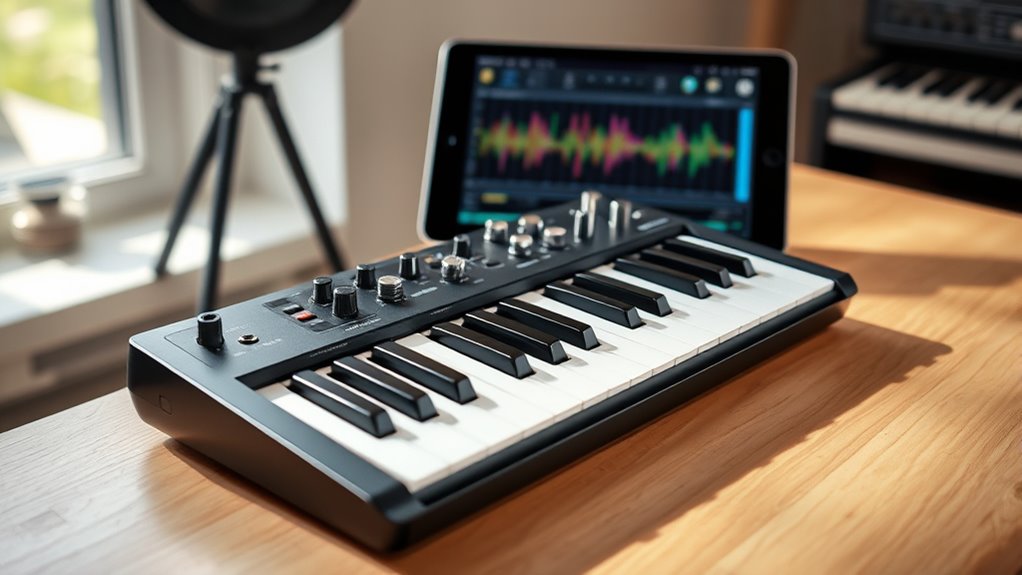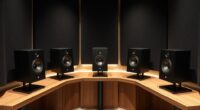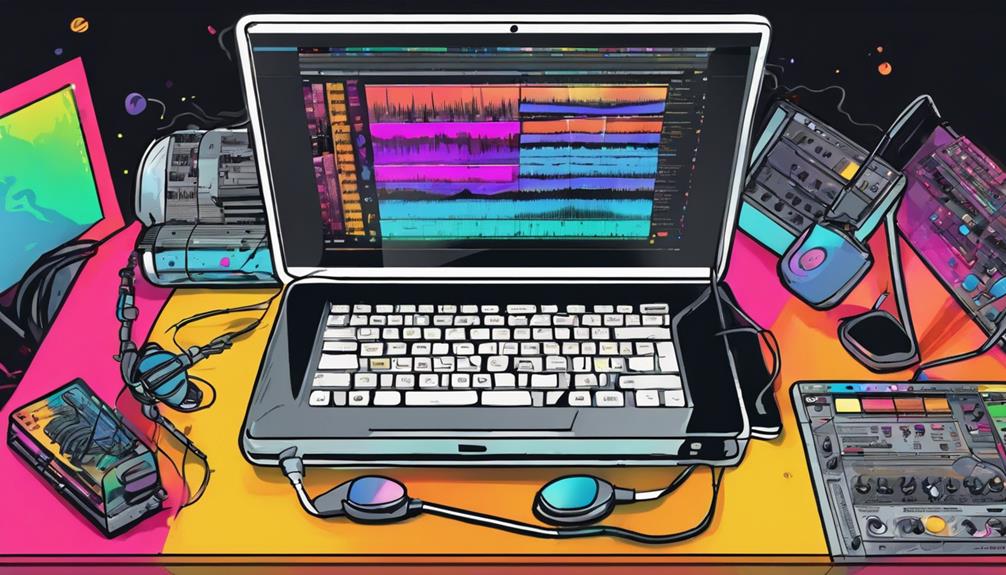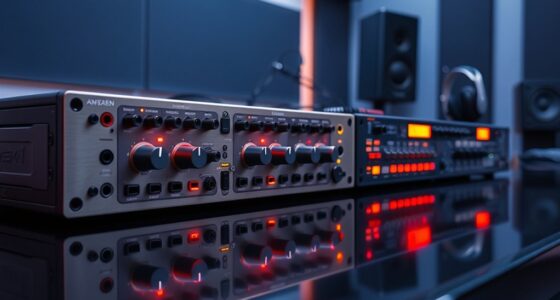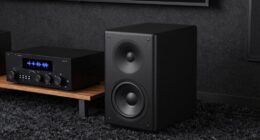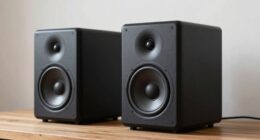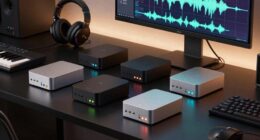Looking for the best MIDI keyboards for iOS in 2025? I’ve found 15 excellent options that suit every need, from compact controllers with drum pads to full-size semi-weighted keyboards perfect for serious practice. Whether you’re a beginner or a pro, these models offer Bluetooth, USB-C, and compatibility with apps and software. Want to discover which ones fit your style? Keep going to get all the details on these top picks.
Key Takeaways
- The list features portable, lightweight MIDI keyboards compatible with iOS devices, ideal for music creators on the go.
- Many models support Bluetooth MIDI and USB connectivity for seamless integration with iPhones and iPads.
- Keyboards include features like velocity-sensitive keys, pads, and knobs to enhance music production versatility.
- Compatibility with popular music apps and DAWs ensures smooth workflow for mobile music creation.
- The selection covers various sizes and price ranges, catering to beginners, hobbyists, and professional producers alike.
Digital Piano Keyboard for Beginners (Full Size 88 Keys)
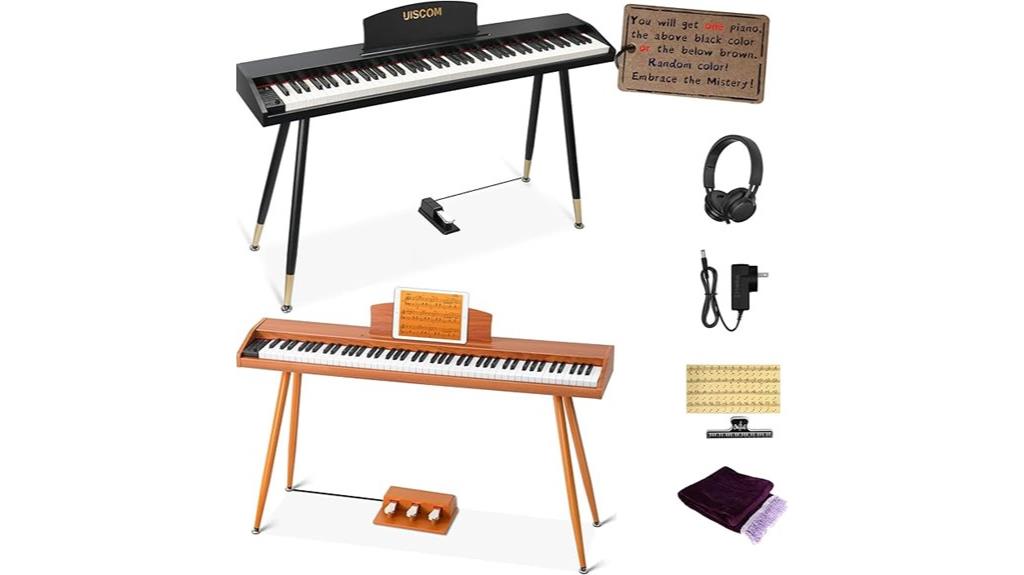
Are you a beginner looking for a full-sized digital piano that combines realistic feel with versatility? I found the UISCOM Digital Piano Keyboard perfect for newcomers. It features 88 semi-weighted keys that mimic acoustic piano touch, offering a responsive and lively playing experience. The sleek black or brown finish fits well in any home, and the included stand, headphones, and sheet music stand make setup easy. With 80 demo songs, 600 tones, and 800 rhythms, it’s great for exploring different sounds. Plus, its USB and Bluetooth connectivity let you connect to apps and devices effortlessly, making practice both fun and flexible.
Best For: beginners and novice pianists seeking an affordable, full-sized digital piano with realistic touch and versatile features.
Pros:
- Full 88-key semi-weighted keyboard with a realistic acoustic piano feel.
- Extensive sound library with 600 tones, 80 demo songs, and 800 rhythms for creative exploration.
- Easy connectivity via USB and Bluetooth, compatible with various apps and devices for enhanced learning.
Cons:
- Keys are semi-weighted but not fully weighted, which may be less authentic for advanced players.
- Limited advanced features like true weighted keys and Bluetooth functionality.
- Some users report minor issues with the included music stand and sound variation options.
Piano Keyboard 61 Keys, Folding Digital Piano with Light-up Keys
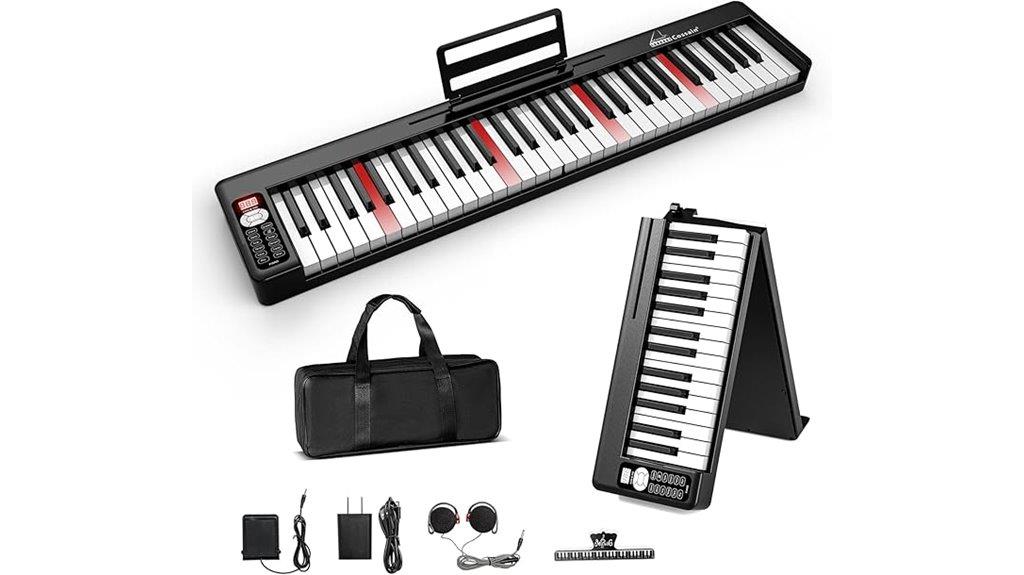
If you’re looking for a portable keyboard that combines convenience with learning features, the Cossain 61-key folding digital piano is an excellent choice. It’s lightweight at just over 8 pounds, folds easily, and comes with a carry case, stand, and piano bag, making it perfect for travel or practice. The semi-weighted, touch-sensitive keys mimic real piano feel, and the light-up keys help beginners learn notes quickly. Powered by a rechargeable battery offering 8-10 hours of use, it connects effortlessly via Bluetooth, USB-C, or headphone jack. Despite some minor build flaws, it’s a versatile, compact option for musicians on the go.
Best For: beginners, travelers, and hobbyists seeking a portable, feature-rich digital piano for practice and learning on the go.
Pros:
- Lightweight and foldable design for easy transport and storage
- Semi-weighted, touch-sensitive keys that improve playing experience
- Includes useful accessories like a carry case, stand, and pedal
Cons:
- Some users report plastic keys feeling cheap or springy over time
- Build quality issues such as hinge play and potential mechanical malfunctions
- Basic built-in sound quality suitable for practice but not professional performances
AODSK Beginner Digital Piano 88-Key Full-Size Electric Keyboard
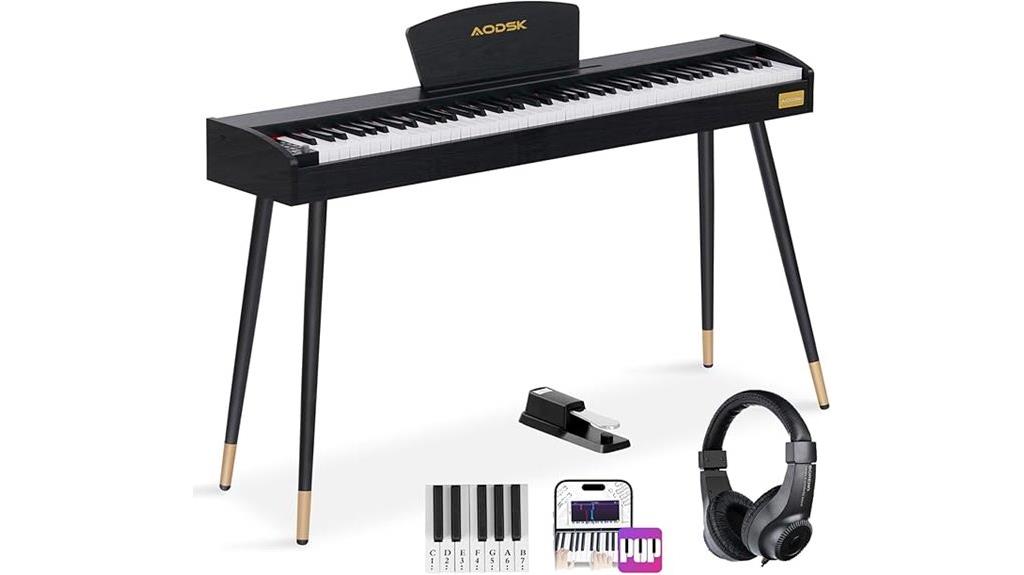
The AODSK Beginner Digital Piano 88-Key Full-Size Electric Keyboard stands out as an excellent choice for beginners and adult learners seeking a realistic piano experience without breaking the bank. Its full-size, weighted keys mimic an acoustic piano, providing responsive touch and expressiveness. The sleek matte finish and modern design make it a stylish addition to any home, doubling as decor. It offers multiple sounds, headphone connectivity for silent practice, and compatibility with iPads and smartphones via USB-MIDI. With included accessories like a sheet music stand and sustain pedal, it’s a practical, value-packed option perfect for learning and casual play.
Best For: beginner and adult learners seeking an affordable, realistic digital piano for practice and casual playing at home.
Pros:
- Full-size, weighted keys that simulate acoustic piano feel for better practice experience
- Modern, stylish design with matte finish that complements home decor
- Includes essential accessories like a sustain pedal, sheet music stand, and note stickers for beginners
Cons:
- Low-quality headphones that may affect sound clarity during silent practice
- Limited volume variation between levels 1-10, which may restrict dynamic playing
- Occasional reports of keys losing sound or sustain pedal malfunctioning over time
Donner DMK25 Pro MIDI Keyboard Controller, 25-Key USB-C MIDI Keyboard with Drum Pads
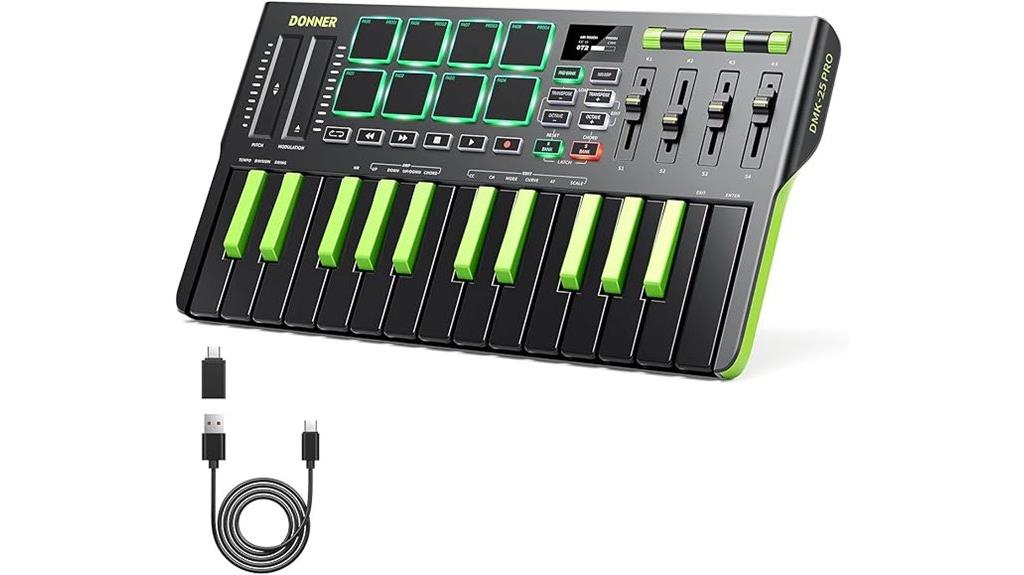
For musicians seeking a portable and versatile MIDI controller, the Donner DMK25 Pro stands out with its 25 mini keys, 8 drum pads, and intuitive control features. Weighing just 2.53 pounds, it’s perfect for travel and mobile setups. Its OLED display, personalized touch bar, and innovative wheels give you creative control, while compatibility with popular DAWs like Ableton Live and Logic Pro guarantees seamless integration. Though setup can be tricky and software isn’t included, many users appreciate its responsive keys, dynamic scale mode, and transport controls. Overall, it’s a solid, budget-friendly option for beginners and on-the-go creators looking for advanced features in a compact package.
Best For: musicians and producers seeking a portable, budget-friendly MIDI controller with advanced control features for mobile or home studio use.
Pros:
- Compact and lightweight design makes it easy to carry and ideal for on-the-go music creation
- Responsive keys and drum pads suitable for quick ideas and dynamic performances
- Intuitive controls like the OLED display, touch bar, and transport buttons enhance creative flexibility
Cons:
- Setup can be complex with software installation and configuration challenges
- Limited customization in scale mode and some restrictions in chord and arpeggio functions
- Software compatibility issues may require third-party apps or additional troubleshooting
M-VAVE 25-Key USB MIDI Keyboard Controller with Drum Pads and Bluetooth
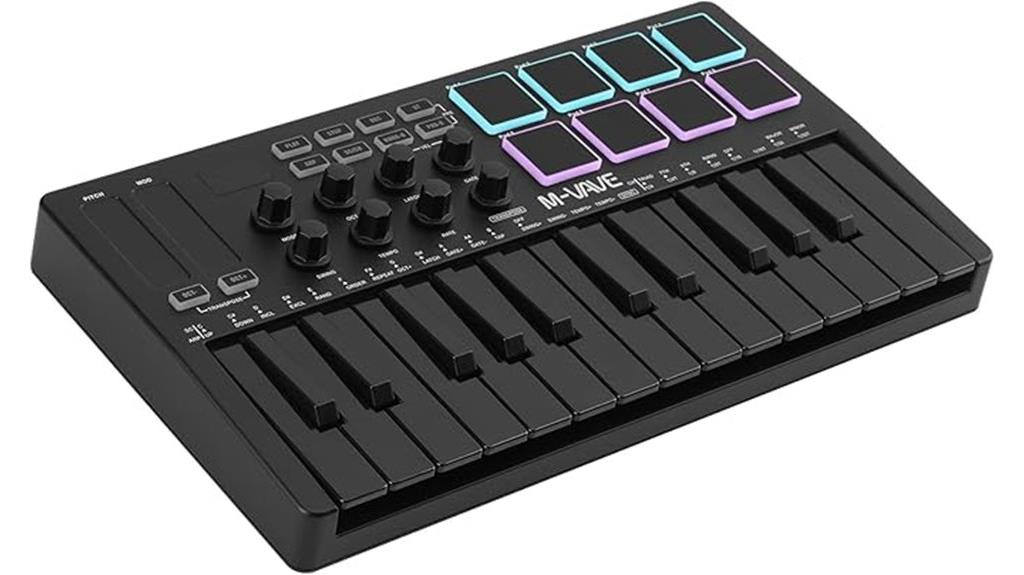
Designed for musicians on the move, the M-VAVE 25-Key USB MIDI Keyboard Controller combines portability with versatile features, making it ideal for both studio and live performances. It boasts 25 velocity-sensitive mini keys, 8 RGB backlit drum pads, and 8 assignable rotary encoders for detailed control. Plus, its capacitive touch stripes for pitch bending add expressive options. The keyboard is USB powered and supports Bluetooth, enabling wireless connection to iOS devices, with a built-in 2,000 mAh battery for up to 16 hours of use. Its smart functions and compatibility with major DAWs make it a flexible tool for creators on the go.
Best For: musicians, beat makers, and producers seeking a portable, versatile MIDI controller for studio, live, or mobile music creation.
Pros:
- Compact and lightweight design for easy portability and on-the-go use
- Wireless Bluetooth connectivity and long-lasting 16-hour battery enhance mobility and convenience
- Features like velocity-sensitive keys, RGB drum pads, and touch stripes provide expressive control and versatility
Cons:
- Limited 25 keys may be restrictive for complex performances or arrangements
- Absence of built-in sounds; requires connection to compatible DAWs or virtual instruments
- May require some setup time for optimal integration with various software platforms
Akai MPK Mini MK3 25-Key USB MIDI Controller with Drum Pads and Software
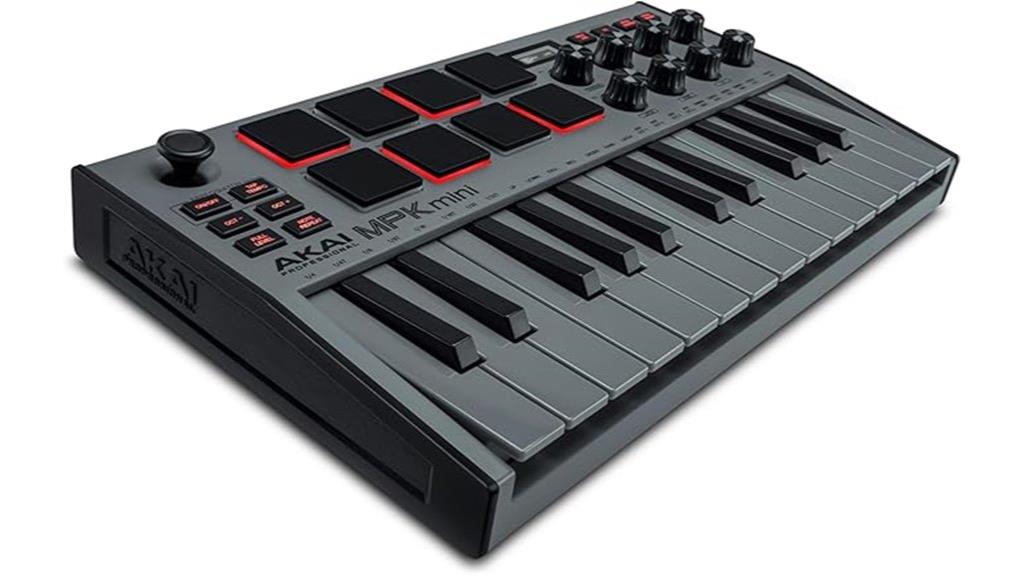
If you’re looking for a portable MIDI controller that combines versatility with intuitive control, the Akai MPK Mini MK3 stands out as an excellent choice. Its compact design features 25 velocity-sensitive keys, 8 backlit MPC-style pads, and 8 assignable knobs, making it perfect for on-the-go music creation. The thumbstick adds expressive pitch and modulation control, while the OLED display provides real-time feedback. It’s compatible with major DAWs and supports Native Kontrol Standard, plus bundled with powerful software like MPC Beats and Komplete sound packs. Lightweight and durable, it’s ideal for travel, studio work, or quick jam sessions.
Best For: musicians, producers, and hobbyists seeking a portable, versatile MIDI controller with intuitive controls for music production on the go.
Pros:
- Compact, lightweight design ideal for travel and small studio setups
- Versatile controls including drum pads, assignable knobs, and expressive thumbstick
- Bundled with powerful software like MPC Beats and Komplete sound packs for immediate music creation
Cons:
- Smaller keys may feel less comfortable for extended playing sessions
- Some users find the learning curve with software and feature mapping
- Build quality, while durable, is primarily plastic and may feel less premium compared to larger controllers
M-Audio Keystation 49 MK3 USB MIDI Keyboard Controller
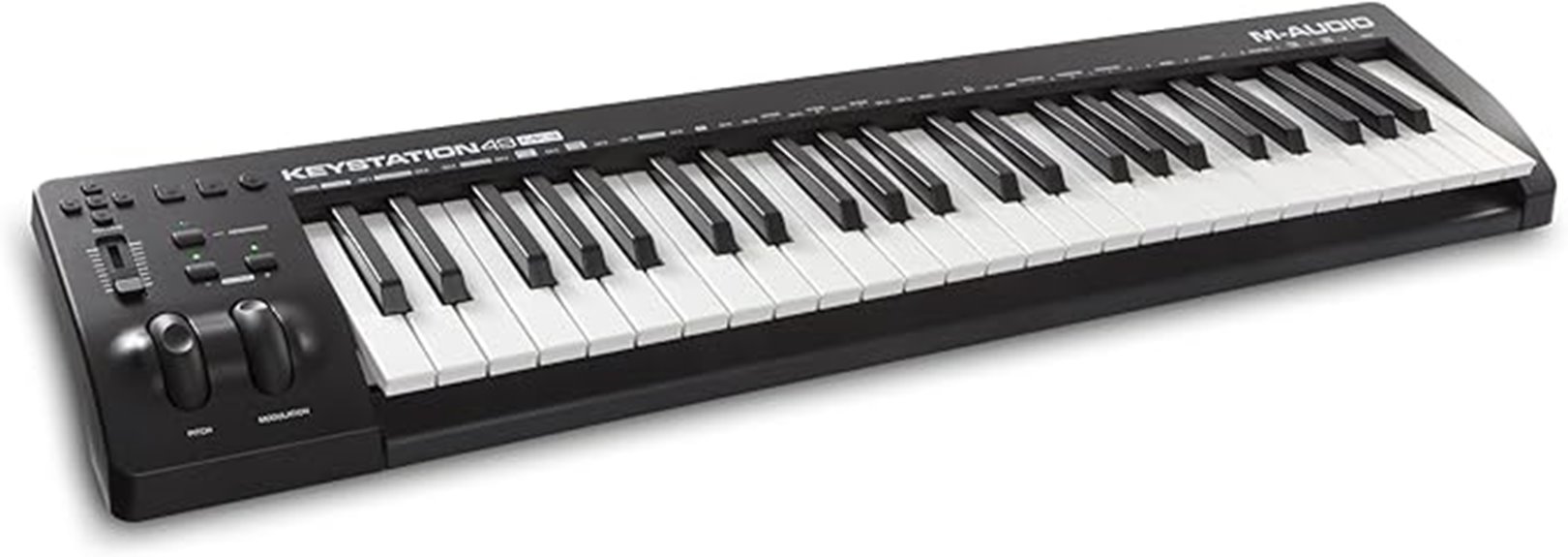
The M-Audio Keystation 49 MK3 stands out as an excellent choice for musicians and producers seeking a portable, plug-and-play MIDI keyboard that works seamlessly with iOS devices. Its full-size, velocity-sensitive keys deliver a natural feel, perfect for composing on the go. The controller includes assignable controls, pitch and modulation wheels, and octave buttons, all in a lightweight, compact design. It connects effortlessly via USB—compatible with Windows, Mac, and iOS (using an Apple Camera Adapter)—without needing drivers. With a solid software bundle and reliable performance, the Keystation 49 MK3 offers great value for both beginners and experienced creators.
Best For: musicians, producers, and educators seeking a portable, plug-and-play MIDI keyboard compatible with Windows, Mac, and iOS devices for studio and on-the-go music creation.
Pros:
- Full-size velocity-sensitive keys with natural feel for expressive playing
- Plug-and-play USB connectivity compatible with multiple operating systems and iOS devices
- Comes with a comprehensive software bundle suitable for beginners and intermediate users
Cons:
- Lacks MIDI out port, which may limit external hardware integration
- Keys are not weighted, which might be a drawback for pianists preferring weighted action
- Slightly limited control options compared to more advanced MIDI controllers
Donner USB-C MIDI Keyboard Controller, 25-Key Portable MIDI Keyboard with Drum Pads and Features
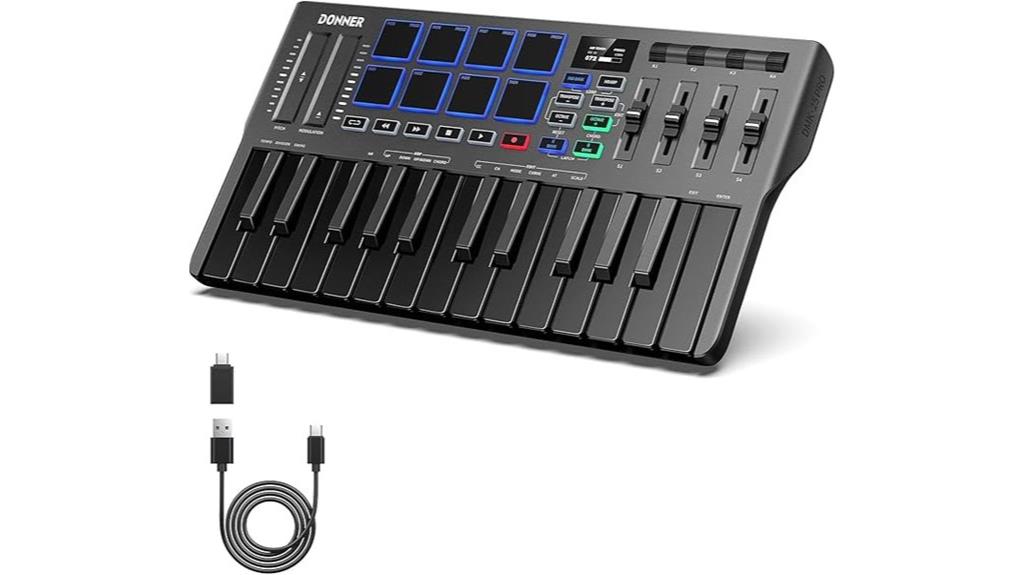
For musicians seeking a portable MIDI controller that offers both versatility and ease of use on iOS devices, the Donner DMK 25 Pro stands out with its compact 25-key layout and built-in drum pads. It features an OLED display, smart scales, arpeggio, note repeat, and customizable controls, making creative play intuitive. The velocity-sensitive keys and drum pads enhance expression, although some users find sensitivity inconsistent. Connecting via USB-C, it works with PCs, tablets, and smartphones, supporting popular DAWs like Logic and Cubase. While setup can be tricky and software installation complex, its affordability and extensive features make it a solid choice for on-the-go music creation.
Best For: musicians and producers seeking a portable, feature-rich MIDI controller compatible with iOS devices for on-the-go music creation.
Pros:
- Compact, lightweight design ideal for portability and mobile use
- Built-in drum pads, smart scales, arpeggio, and customizable controls enhance creative flexibility
- Compatible with popular DAWs like Logic and Cubase, supporting versatile music production
Cons:
- Setup and software installation can be complex and challenging, especially on Windows and mobile platforms
- Some users report inconsistent velocity sensitivity on keys and drum pads
- Limited standalone sound capabilities; requires connection to a computer or mobile device for operation
Donner Mini MIDI Keyboard (N-25)
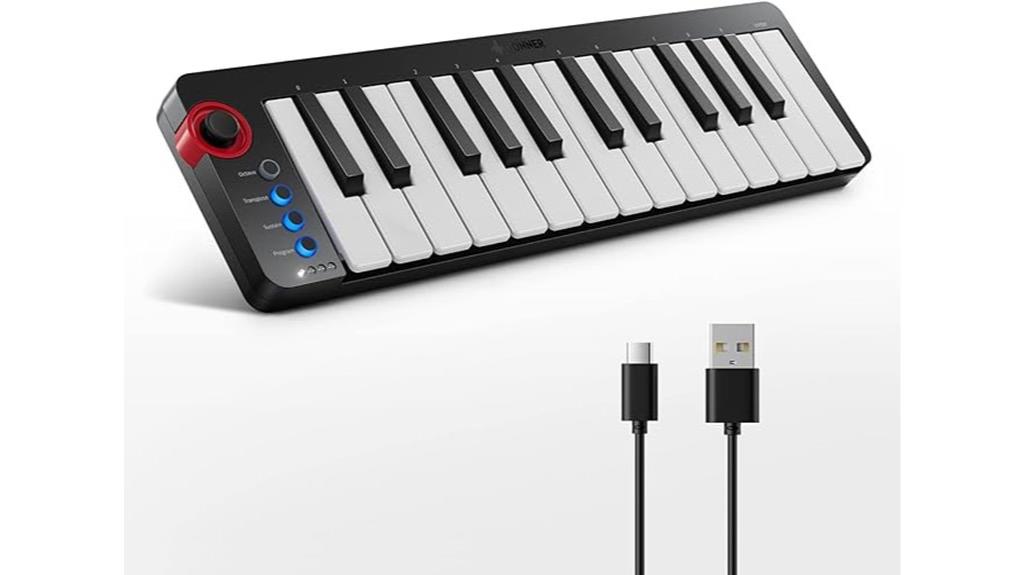
Designed with portability and ease of use in mind, the Donner Mini MIDI Keyboard (N-25) is perfect for musicians who need a compact controller without sacrificing expressive control. It features 25 velocity-sensitive mini keys that make creating melodies and riffs intuitive and expressive. The light-up buttons provide helpful visual feedback, while the pitch-bend wheel adds dynamic control. It’s plug-and-play compatible with Mac, iOS, PC, iPhone, and iPad via USB-MIDI, with no extra drivers needed. Its user-friendly layout includes arpeggiator, sustain, octave, and tap tempo functions, making it ideal for beginners and experienced users alike on the go.
Best For: musicians and music producers seeking a portable, beginner-friendly MIDI keyboard with expressive controls and easy setup for practice, composition, and learning.
Pros:
- Compact and lightweight design ideal for on-the-go use and small setups
- Plug-and-play compatibility with multiple devices and DAWs without extra drivers
- Includes educational resources and beginner-friendly features like arpeggiator and visual feedback
Cons:
- Limited to 25 mini keys, which may be restrictive for complex playing or advanced performances
- No built-in sounds or onboard sounds, requiring connection to external software or instruments
- May lack advanced controls found on larger MIDI controllers for professional studio use
midiplus AKM320 Midi Keyboard Controller

If you’re looking for a compact MIDI keyboard that offers essential controls without sacrificing portability, the midiplus AKM320 is an excellent choice. It features 32 velocity-sensitive, mid-size keys perfect for on-the-go music creation. The controller includes a pitch wheel, modulation wheel, octave buttons, and transpose buttons, giving you versatile control over your sound. It connects easily via a USB B port, and the included cable makes setup simple. Designed in Taiwan, this lightweight keyboard is ideal for integrating into your computer setup for music production or MIDI control. It’s a reliable, portable option for musicians who want quality and convenience.
Best For: musicians and producers seeking a portable, easy-to-use MIDI keyboard for music creation and MIDI control on the go.
Pros:
- Compact and lightweight design makes it highly portable and ideal for mobile setups
- Velocity-sensitive 32 keys provide expressive playing experience
- Includes essential controls like pitch wheel, modulation wheel, octave, and transpose buttons for versatile sound manipulation
Cons:
- No built-in sounds or advanced features, limiting standalone use
- Sustain pedal not included, requiring additional purchase for full control
- Limited to 32 keys, which may be insufficient for complex piano arrangements
LEKATO Wireless MIDI Adapter for Mac, iOS, Windows
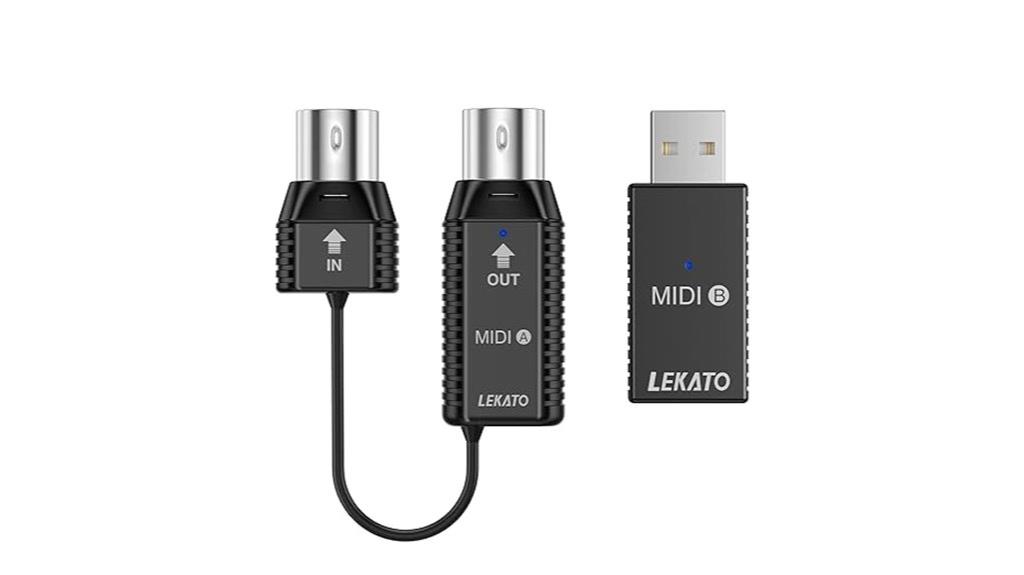
The LEKATO Wireless MIDI Adapter stands out because it delivers ultra-low latency (just 3ms), making it ideal for musicians who need immediate, responsive control without the hassle of cables. It’s compatible with devices featuring 5-pin MIDI ports like controllers, keyboards, and synths, and works seamlessly with Mac, iOS, and Windows. Setup is straightforward—no drivers needed—using a simple plug-and-play design. The adapter supports Bluetooth MIDI via a USB dongle, allowing flexible placement and remote control during performances or studio sessions. Whether on stage or in the studio, it ensures stable, wired-like transmission, freeing you from clutter and enhancing your creative flow.
Best For: musicians and producers seeking a reliable, low-latency wireless MIDI solution for live performances or studio setups across Mac, iOS, and Windows.
Pros:
- Ultra-low latency of just 3ms ensures real-time responsiveness
- Easy plug-and-play setup without driver installation
- Compatible with a wide range of MIDI hardware and operating systems
Cons:
- Requires Bluetooth MIDI app for connection, not direct phone Bluetooth pairing
- Needs a USB dongle for Windows, which adds an extra accessory to manage
- Limited to devices with 5-pin MIDI ports, not compatible with USB-C or other connection types
Ktaxon 88-Key Electric Piano Keyboard with 128 Rhythms and Tones
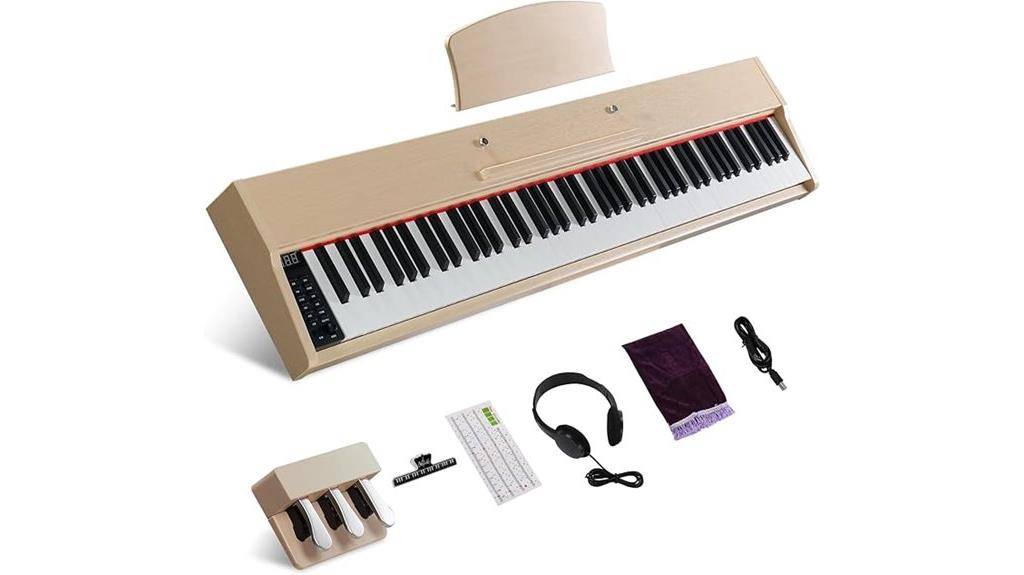
The Ktaxon 88-Key Electric Piano Keyboard stands out for its realistic semi-weighted keys and extensive sound options, making it an excellent choice for intermediate players and serious hobbyists. Its responsive keys accurately capture nuances from soft to strong crescendos, while the three pedals—sustain, soft, and sostenuto—enhance musical expression. The sleek, compact design with a woodgrain finish fits well in any home setup, and it’s portable enough for practice anywhere. With 128 tones, rhythms, and effects like Chorus and Reverb, it offers versatile soundscapes. Dual headphone jacks and multiple connectivity options make practice and music creation seamless, providing great value and performance.
Best For: intermediate players and serious hobbyists seeking a realistic, versatile digital piano for home practice and music creation.
Pros:
- Responsive semi-weighted keys that accurately capture musical nuances
- Extensive sound options with 128 tones, rhythms, and effects like Chorus and Reverb
- Multiple connectivity features including Bluetooth, USB, MIDI, and dual headphone jacks for versatile use
Cons:
- Built-in sounds may be somewhat limited for professional performance needs
- Some users report issues with headphone quality and pedal responsiveness
- Slightly heavier weight (27.9 pounds) may affect portability for some users
88 Key Semi-Weighted Keyboard Piano for Beginners with MIDI, Bluetooth, 1000 Tones and Rhythms
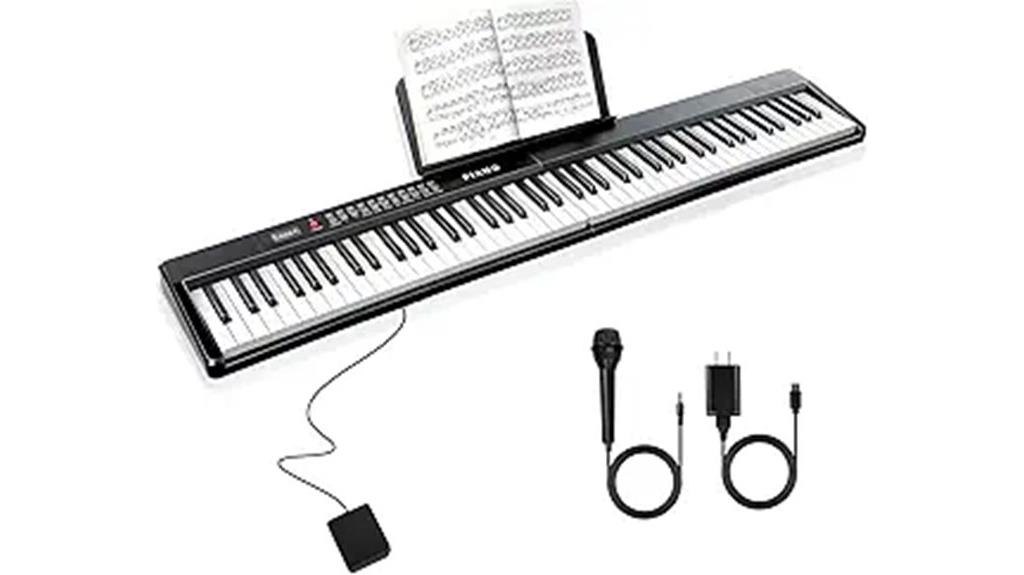
Beginners seeking an affordable, portable digital piano that combines realistic feel with versatile connectivity will find this 88-key semi-weighted keyboard an ideal choice. It offers Bluetooth, MIDI, and MP3 compatibility, along with 1000 tones and rhythms, making it perfect for exploring different sounds and styles. The semi-weighted keys mimic traditional piano touch, while the foldable design ensures easy transport and storage. With built-in demo songs, teaching modes, and essential accessories like a sustain pedal and microphone, it’s a thorough starter instrument. Despite some concerns about durability and sound quality, its affordability and feature set make it an excellent option for new players on the go.
Best For: beginners and young musicians seeking an affordable, portable digital piano with versatile connectivity and realistic touch.
Pros:
- Semi-weighted keys provide a more authentic piano feel suitable for beginners.
- Multiple functions including Bluetooth, MIDI, and MP3 compatibility enhance learning and creativity.
- Foldable design and included accessories make it highly portable and convenient for beginners on the go.
Cons:
- Some users report flimsy construction and stability issues with the foldable design.
- Sound quality and built-in speakers are considered underwhelming by certain reviewers.
- Accessories like headphones and pedal may be of lower quality and less durable over time.
Digital Piano 88 Key Semi Weighted Keyboard with Stand
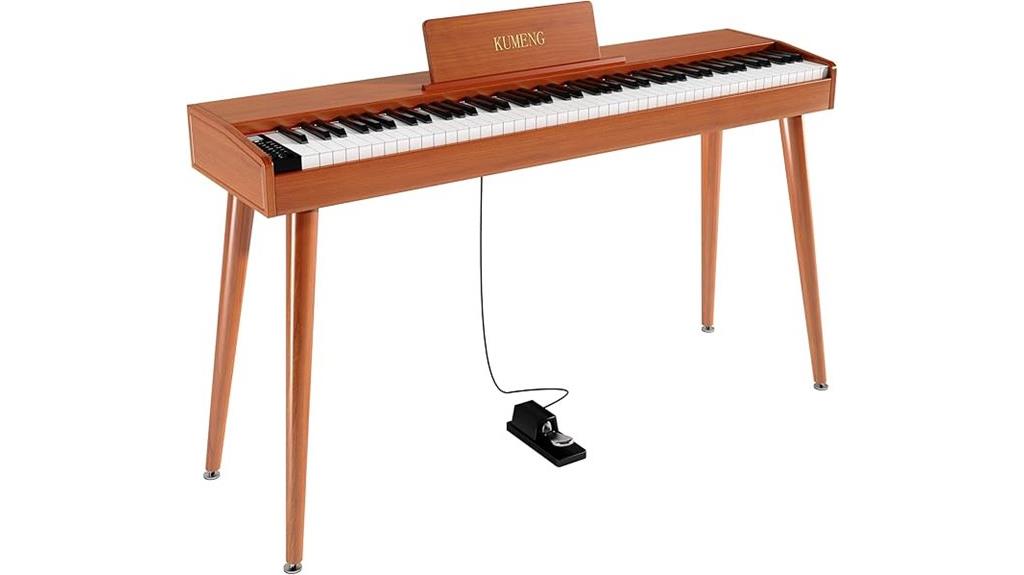
If you’re seeking a versatile digital piano that balances realistic feel with advanced features, the 88-key semi-weighted keyboard with stand is an excellent choice. Its full-size keys are perfect for developing touch, making it ideal for beginners and learning environments. The semi-weighted keys offer a natural playing experience, closely mimicking traditional pianos. Equipped with 800 tones and 128 polyphony, it supports expressive performances and diverse styles. The intuitive control panel simplifies navigation, while USB/MIDI ports enable seamless connection to phones, iPads, or PCs. Its elegant matte finish and environmentally friendly materials make it both stylish and sustainable for any home or studio.
Best For: beginners, students, and home musicians seeking a realistic, feature-rich digital piano with a natural playing feel.
Pros:
- Full 88-key semi-weighted keyboard mimics traditional grand pianos for authentic touch.
- Wide variety of 800 tones and 128 polyphony support diverse musical styles and expressive playing.
- Easy-to-use multi-functional control panel with clear display simplifies operation and navigation.
Cons:
- Semi-weighted keys may not satisfy advanced pianists seeking fully weighted, hammer-action keys.
- The absence of built-in speakers means it requires external amplification for live practice.
- Limited onboard effects and customization options compared to higher-end digital pianos.
Akai MPK Mini Plus USB MIDI Keyboard Controller
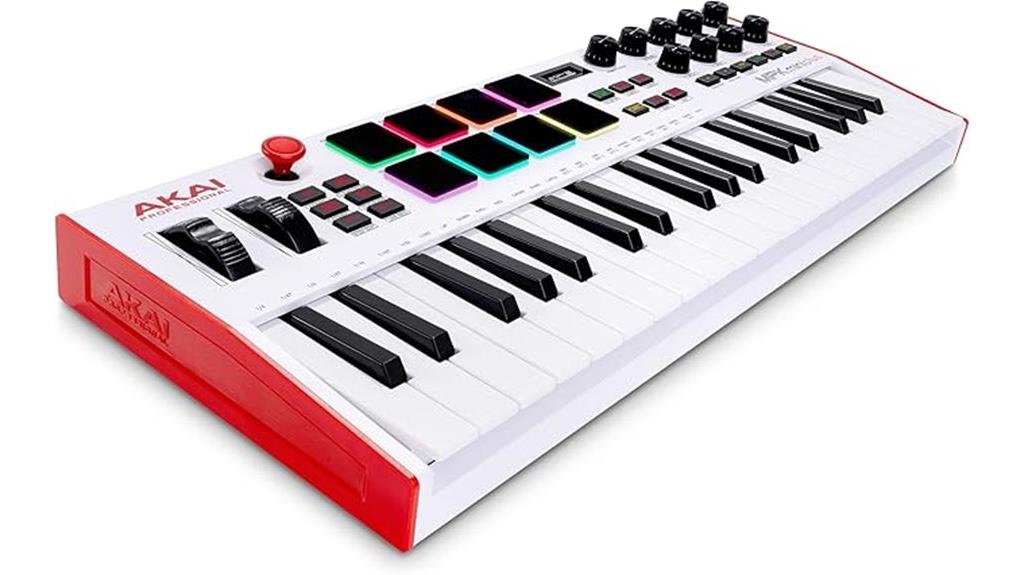
For musicians seeking versatility both in studio and live settings, the Akai MPK Mini Plus USB MIDI Keyboard Controller stands out with its 37-key mini keyboard and integrated 8 MPC pads, offering expressive melodic, harmonic, and rhythmic control. Its advanced connectivity includes USB power, MIDI I/O, and CV/Gate ports, making it compatible with various gear and modular setups. The built-in 64-step sequencer allows for standalone recording and composing, supporting one drum track and one melodic track. Plus, with Native Kontrol Standard support and access to curated sound libraries, it’s a powerful, portable option for on-the-go music production and performance.
Best For: musicians and producers seeking a portable, versatile MIDI controller with integrated sequencing and comprehensive connectivity for both studio and live performance settings.
Pros:
- Offers a full range of performance controls with 37 keys and 8 MPC pads for expressive playing and drum programming
- Advanced connectivity options including USB, MIDI I/O, and CV/Gate ports for seamless integration with various gear and modular setups
- Built-in 64-step sequencer enables standalone music creation without a computer, supporting multiple tracks and up to 8 notes per track
Cons:
- Limited to one melodic and one drum track in standalone mode, which may restrict complex compositions
- Compact 37-key keyboard may not suit performers requiring full-sized keys for detailed playing
- The limited sound library access depends on compatible sound packs, which may require additional purchases
Factors to Consider When Choosing a MIDI Keyboard for iOS
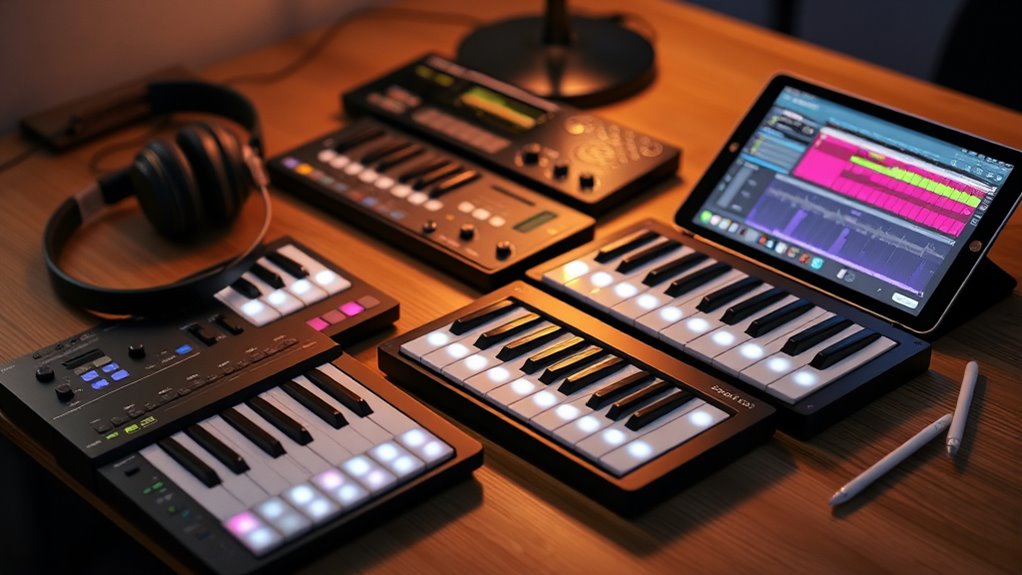
When choosing a MIDI keyboard for iOS, I focus on compatibility with my devices and the available connectivity options like Bluetooth or USB. I also consider the size and feel of the keys to match my playing style, along with how portable and easy to power the keyboard is for my setup. These factors help me find a device that fits my needs perfectly.
Compatibility With Ios Devices
Choosing a MIDI keyboard for iOS devices requires careful attention to compatibility features that guarantee smooth integration. First, make sure the keyboard explicitly states compatibility with iPads and iPhones to avoid connection issues. Supporting Bluetooth MIDI is a huge plus, as it allows wireless pairing without extra adapters. Also, check if the device can connect via USB-C or Lightning, depending on your iOS device’s port, for reliable wired use. It’s important to verify that the keyboard works well with iOS-specific apps like GarageBand, ensuring seamless software integration. Additionally, see if the device requires special drivers or setup steps—native support simplifies everything. Being thorough here helps you pick a keyboard that plays nicely with your device, making your music creation process smoother.
Connectivity Options (Bluetooth/USB)
Connectivity options like Bluetooth and USB considerably influence how smoothly your MIDI keyboard works with iOS devices. Bluetooth allows wireless MIDI transmission, freeing you from cables and enhancing mobility during your music sessions. It’s convenient for quick setup and on-the-go use, with latency usually around 3ms, though it can vary. USB connections, on the other hand, provide a stable, high-speed link that’s ideal for reliable performance and power supply, especially when using compatible adapters like USB-C or Lightning. Some MIDI keyboards combine both options, offering maximum flexibility for different environments and preferences. When selecting a keyboard, check that it supports Bluetooth MIDI or USB compatibility with your iOS device, ensuring seamless integration and a smooth creating experience.
Key Size and Feel
The size and feel of the keys on a MIDI keyboard considerably impact your playing experience, especially when using it with iOS devices. Smaller, mini keys (25-32 keys) are more portable and perfect for quick setups on the go, but they limit your range and may feel less natural for piano techniques. Full-size keys (88 keys) offer a realistic playing experience, ideal for serious practice, but add bulk and weight. Semi-weighted keys strike a good balance, providing responsive touch without the heaviness of fully weighted keys, making them suitable for mobile use. Touch sensitivity is also vital, as it allows for expressive performances. Ultimately, choosing the right key size and feel depends on your portability needs and how expressive you want your playing to be.
Power Supply Requirements
When selecting a MIDI keyboard for iOS, understanding its power supply requirements is crucial to guarantee seamless portability and reliable performance. Many keyboards connect via Lightning or USB-C, so I check if I need an adapter for my device. Some models draw power through USB, making them bus-powered and simple to use on the go, while others require an external power source, which can add bulk. I also look for keyboards with built-in rechargeable batteries, allowing wireless operation and increased mobility. It’s important to ensure the power needs match my iOS device’s output to avoid performance issues or damage. Lastly, I consider low-power modes that extend battery life, helping me stay productive longer without constantly recharging.
Portability and Size
Choosing a portable MIDI keyboard for iOS means prioritizing size and weight so I can easily carry it wherever I go. I look for compact models with 25 to 37 keys, which are easier to slip into bags or backpacks. Wireless connectivity like Bluetooth is a game-changer, removing the hassle of cables during mobile sessions. I prefer controllers with built-in batteries or USB power, so I don’t need external adapters, making setup quick and simple. Slim profiles and foldable designs also help, allowing the keyboard to nest comfortably in tight spaces. finally, I double-check compatibility with my iOS device, ensuring the size and connection method suit my on-the-move lifestyle. This way, I stay creative without sacrificing portability.
Software Compatibility & Apps
Ensuring your MIDI keyboard works smoothly with iOS devices starts with checking its compatibility with Bluetooth MIDI or USB connections, so I can connect without hassle. I look for keyboards that support Bluetooth MIDI, especially Bluetooth 5.0, for low latency and real-time responsiveness. Compatibility with popular iOS music apps like GarageBand, Cubasis, or BeatMaker is essential for seamless integration. I also verify if the keyboard offers necessary drivers or firmware updates to guarantee smooth operation on iOS. Some models include dedicated iOS app support or clear documentation, making pairing and setup easy on my iPhone or iPad. This compatibility ensures I can focus on creating music without worrying about technical glitches or limited app support, making my setup more efficient and enjoyable.
Battery Life and Usage
Battery life plays a key role in how effectively I can use my MIDI keyboard with iOS devices, especially when I’m on the go or performing outdoors. A long-lasting battery guarantees I can create music without constantly searching for outlets or recharging. Most wireless MIDI controllers last between 8 to 16 hours on a single charge, depending on usage and features. Quick-charging options are a bonus, letting me recharge during short breaks. Over time, battery performance can decline, so it’s wise to check user reviews on durability. Power management features like auto-sleep or low-power modes also help extend battery life during periods of inactivity. Overall, good battery life means uninterrupted music sessions and more freedom to focus on my creativity.
Additional Control Features
When selecting a MIDI keyboard for iOS, it’s essential to take into account the additional control features that can enhance my music production and performance. Assignable knobs, faders, and rotary encoders offer real-time sound modulation and mixing capabilities, making my workflow more dynamic. Specialized controls like arpeggiators, octave switches, and built-in drum pads provide versatile options beyond just playing keys, giving me creative flexibility during live shows or studio sessions. Touch-sensitive strips and programmable buttons help me customize my setup, improving efficiency. Some controllers include dedicated transport controls—play, pause, and record—streamlining my interactions with DAW apps on iOS. Features like MIDI learn allow easy control mapping, making my creative process more intuitive and seamless.
Frequently Asked Questions
How Does Latency Impact Live Music Creation on Ios MIDI Keyboards?
Latency can really affect live music creation on iOS MIDI keyboards. When there’s noticeable delay between pressing a key and hearing the sound, it throws off my timing and flow. Low latency is vital for staying in sync and performing confidently. I always look for keyboards with minimal latency to guarantee my music feels natural and responsive, especially when I’m improvising or recording live.
Can These MIDI Keyboards Integrate With Popular Ios Music Apps Seamlessly?
When I look at how well MIDI keyboards integrate with iOS music apps, I find that most top models offer seamless compatibility. I personally test these devices to guarantee they connect easily via Bluetooth or USB, and they work smoothly with popular apps like GarageBand, Cubasis, or Auria. This reliable integration helps me focus on creating without worrying about connectivity issues, making my music production process much more enjoyable.
What Are the Power Options for Portable MIDI Keyboards on the Go?
Did you know that over 60% of portable MIDI keyboards use built-in batteries? When I look for power options, I prioritize devices with rechargeable batteries or USB power, making them easy to use anywhere. Most models I’ve tested can run on batteries for hours or connect directly to my iOS device via USB or Lightning, ensuring I can make music anytime, whether I’m traveling or just away from outlets.
Are There Specific MIDI Keyboard Features Optimized for Mobile Music Production?
When it comes to mobile music production, I look for MIDI keyboards with features tailored for portability and ease of use. Key features include compact size, lightweight design, and built-in controllers like knobs and pads for quick adjustments. Seamless integration with iOS devices is essential, along with touch-sensitive keys for expressive playing. Bluetooth connectivity also helps reduce clutter, making my setup more flexible and ready to create anywhere.
How Do Firmware Updates Improve MIDI Keyboard Performance on Ios Devices?
Sometimes, upgrades whisper promises of smoother journeys. Firmware updates do just that for MIDI keyboards on iOS—they fine-tune performance, fix bugs, and boost stability. With each update, I notice more reliable connectivity, quicker response times, and better compatibility with my apps. It’s like giving my gear a reset, ensuring I stay creative without hiccups. Staying current with updates helps my music flow seamlessly, no matter where I create.
Conclusion
If you’re diving into music creation on iOS, choosing the right MIDI keyboard is like picking the perfect brush for a masterpiece—essential for bringing your ideas to life. Whether you’re a beginner or pro, there’s a device out there that fits your style and needs. Don’t rush—test a few options, and find the one that feels just right. With the right keyboard, your musical journey will be as smooth as a melody floating on air.

